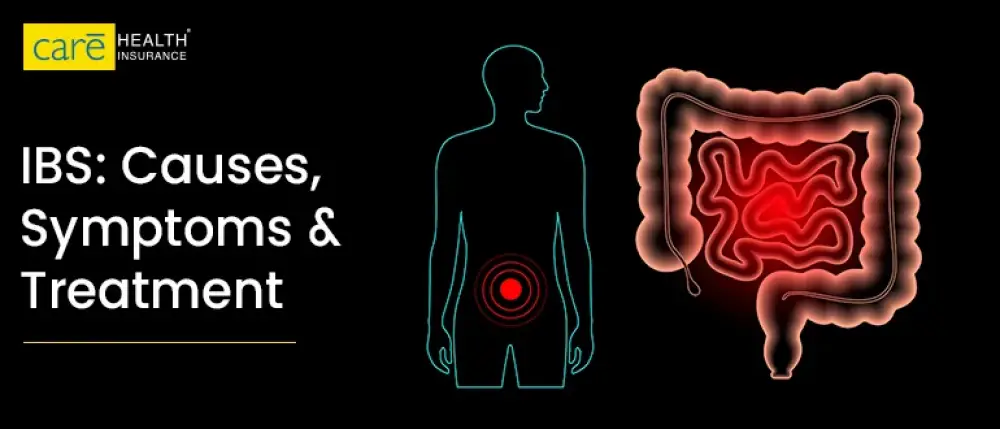Subscribe to get weekly insights
Always stay up to date with our newest articles sent direct to your inbox
Published on 22 Apr, 2025
Updated on 23 Apr, 2025
29 Views
6 min Read

Written by Ritika Malik
Reviewed by Munmi Sharma
favorite0Like
favoriteBe the First to Like
Life isn't always predictable, and neither is your gut when you are living with Irritable Bowel Syndrome (IBS). One moment, you are fine; the next, you are struggling with cramps or rushing to locate the closest restroom. IBS doesn't follow rules, but that doesn't mean you can't take control. With the right strategy, starting from understanding your symptoms, modifying your lifestyle, and seeking proper medical aid, you can manage IBS instead of letting it control you.
Want to know more about IBS? Keep reading. This blog covers everything related to irritable bowel syndrome.
Irritable bowel syndrome (IBS) is one of the most common functional disorders affecting the stomach and intestines, also known as the gastrointestinal tract system. People with this condition suffer from irregular bowel activity. It is a long-term condition that interferes with how the gut functions, even though visible structural impairment or illness is absent.
IBS is identified by frequent digestive distress and inconsistent bowel movements, which might differ for every individual. It is not life-threatening, but it might lead to severe complications affecting an individual's everyday life and overall well-being. Irritable bowel syndrome is a chronic health problem that usually requires continuous lifestyle changes to address its effects on health and overall life quality.
Symptoms of IBS differ from person to person but are often present for a long time. Here are the most common symptoms:
The precise cause of IBS isn't understood. Here are the factors that contribute to the development of irritable bowel syndrome:
Here is how the symptoms of IBS are triggered:
Many people occasionally experience symptoms of irritable bowel syndrome (IBS). However, the chances of developing this functional disorder increase when you:
Although Irritable Bowel Syndrome (IBS) does not usually lead to serious physical health problems, it can cause various complications and significantly affect quality of life. Here are some complications that may arise due to IBS:
It is crucial to consult a health expert if you are experiencing consistent changes in bowel patterns or other irritable bowel syndrome symptoms. It might indicate a serious condition, and you need to keep a tab on these worsening symptoms:
There is currently no definitive test to diagnose Irritable Bowel Syndrome (IBS). However, doctors use the patient's medical history, physical examination, and various tests to rule out other possible conditions. Health experts generally rely on two types of criteria to diagnose IBS:
Rome Criteria: This includes abdominal pain or discomfort that the patient has been experiencing at least once a week for the past three months. This pain or discomfort is related to bowel movements, where doctors assess changes in stool frequency and consistency to help confirm the diagnosis.
Types of IBS: For the diagnosis and treatment of IBS, it is classified into four types based on symptoms:
If a patient continues to experience regular IBS symptoms and there is no improvement after initial IBS treatment, then further tests may be required.
IBS treatment emphasises addressing symptoms because there's no permanent cure. Treatment differs depending on the type of IBS, and it usually involves:
These are usually the first steps in addressing the symptoms of IBS :
Depending on the IBS type and severity, doctors may prescribe:
Laxatives (e.g., polyethylene glycol)
Fiber supplements
Prescription meds: like lubiprostone or linaclotide
Antidiarrheal medications (e.g., loperamide)
Bile acid binders
Eluxadoline or rifaximin (for more severe cases)
Antispasmodics (e.g., dicyclomine, hyoscyamine)
Low-dose antidepressants (TCAS or SSRIs), which help with both pain and gut sensitivity
Since stress plays a significant role in triggering or aggravating Irritable bowel syndrome, psychological therapies can be helpful:
Read More: Inflammatory bowel disease: Causes, symptoms, and treatments
Irritable bowel syndrome isn't a life-threatening condition, but it can seriously affect your quality of life and your wallet. Over time, managing this condition involves numerous doctor visits, dietary consultations, lab tests, prescription medications, and even mental health support like therapy. These costs keep increasing quickly, especially if symptoms become chronic or unpredictable. But do not worry because a comprehensive health insurance policy covers you. Health insurance doesn't just protect you from the "big stress"; it entrusts you to be farsighted, consistent, and stress-free in your IBS care routine.
Remember, when it comes to IBS, it's not about hounding a cure; it's about forming a life where symptoms no longer control your day. Invest in your health, ask the right questions, and give your gut the support it deserves.
Disclaimer: The above information is for reference purposes only. Kindly consult your general physician for verified medical advice. The health insurance benefits are subject to policy terms and conditions. Refer to your policy documents for more information.
favoriteBe the First to Like
शुगर कंट्रोल कैसे करे? जानें, डायबिटीज में क्या खाना चाहिए Care Health Insurance in Health & Wellness
Thyroid : मामूली नहीं हैं महिलाओं में थायराइड होना, जानें इसके लक्षण और घरेलू उपचार Care Health Insurance in Diseases
हाई ब्लड प्रेशर को तुरंत कंट्रोल कैसे करें? देखें इसके उपाय Care Health Insurance in Diseases
प्लेटलेट्स की कमी के लक्षण, कारण और इलाज क्या है Care Health Insurance in Diseases
What is Endocrinology? Hormones, Disorders & Treatment Care Health Insurance in Diseases
Do People with Mental Illness Have Less Heart Disease? Care Health Insurance in Diseases
एक्जिमा क्या है? देखें, इसके लक्षण और इलाज Care Health Insurance in Diseases
Guillain-Barré Syndrome (GBS): Causes, Symptoms and Treatment Care Health Insurance in Diseases